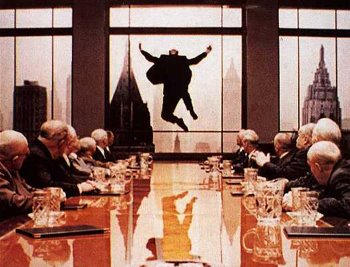 Well, I got my wish from the last posting, and saw The Hudsucker Proxy (1994) again. I've always thought of it as a movie nobody really liked, and confirmed my suspicions by checking out some reviews. Roger Ebert's is particularly telling: He frames it as a debate between the angel on one shoulder who loves the way the movie looks, and the devil on the other who complains it's "all surface and no substance." He gave the movie two stars, because the angel wanted to award it four and the devil wanted to punish it with zero. And so on.
Well, I got my wish from the last posting, and saw The Hudsucker Proxy (1994) again. I've always thought of it as a movie nobody really liked, and confirmed my suspicions by checking out some reviews. Roger Ebert's is particularly telling: He frames it as a debate between the angel on one shoulder who loves the way the movie looks, and the devil on the other who complains it's "all surface and no substance." He gave the movie two stars, because the angel wanted to award it four and the devil wanted to punish it with zero. And so on. Of course, as a comfort movie, such hollowness is not only unimportant, it is an asset. Like Seinfeld--heck, like Gilligan's Island--the best entertainments are about nothing. (And let's give credit where due: A good friend of mine, Gene the bigshot lawyer, a million years ago in college taught me to disdain "socially relevant" TV shows like All in the Family and M*A*S*H--at least those elements of the shows that aspired to seriousness--and to recognize that the fundamental image of the satisfied TV viewer is an enraptured kid wearing a coonskin cap. And I think comedy in general works best at this level. Seinfeld was on Letterman once, and said something simple and true: that his show was so successful because they held to a basic rule: Don't do anything that isn't funny. At first blush, that seems a bit reductive, like the classic advice on how to sculpt a horse: Get a block of marble, and remove everything that doesn't look like a horse. Or Steve Martin's breathless, excited revelation of how to become a millionaire: "OK, first, get a million dollars, then ..." But of course, Seinfeld is right. There are no moral dilemmas in the show--at least none that stop the comedy--no concerns outside of immediate, personal ones, no depth of thought whatsoever. And Seinfeld was always careful to point that out, as it inflicted all kinds of damage on individual selves and their communities, and at times the very fabric of society, without any qualms, without the slightest regrets. In this morally free space, one could go anywhere, ruthlessly cosmopolitan, and point and laugh at whatever, whoever, came one's way.
Of course, as a comfort movie, such hollowness is not only unimportant, it is an asset. Like Seinfeld--heck, like Gilligan's Island--the best entertainments are about nothing. (And let's give credit where due: A good friend of mine, Gene the bigshot lawyer, a million years ago in college taught me to disdain "socially relevant" TV shows like All in the Family and M*A*S*H--at least those elements of the shows that aspired to seriousness--and to recognize that the fundamental image of the satisfied TV viewer is an enraptured kid wearing a coonskin cap. And I think comedy in general works best at this level. Seinfeld was on Letterman once, and said something simple and true: that his show was so successful because they held to a basic rule: Don't do anything that isn't funny. At first blush, that seems a bit reductive, like the classic advice on how to sculpt a horse: Get a block of marble, and remove everything that doesn't look like a horse. Or Steve Martin's breathless, excited revelation of how to become a millionaire: "OK, first, get a million dollars, then ..." But of course, Seinfeld is right. There are no moral dilemmas in the show--at least none that stop the comedy--no concerns outside of immediate, personal ones, no depth of thought whatsoever. And Seinfeld was always careful to point that out, as it inflicted all kinds of damage on individual selves and their communities, and at times the very fabric of society, without any qualms, without the slightest regrets. In this morally free space, one could go anywhere, ruthlessly cosmopolitan, and point and laugh at whatever, whoever, came one's way. The Coen brothers have always known this. And this is one reason why I love their movies so much: They are a vacation from the moral universe, the "burden of freedom," the weight of tragedy--let alone the "eternal delight," as Blake would put it, of the ecstatic recognition of one's power and glory. And while the Coens pay attention to the comic possibilities of such weighty matters--consider the grave figures of their movies, watching the wheels turning, proclaiming a world bigger than any dope in a Coen brothers' picture could ever hope to recognize--those figures themselves are goofy, sometimes out of synch with the heartless machinations of the leading characters.
The Coen brothers have always known this. And this is one reason why I love their movies so much: They are a vacation from the moral universe, the "burden of freedom," the weight of tragedy--let alone the "eternal delight," as Blake would put it, of the ecstatic recognition of one's power and glory. And while the Coens pay attention to the comic possibilities of such weighty matters--consider the grave figures of their movies, watching the wheels turning, proclaiming a world bigger than any dope in a Coen brothers' picture could ever hope to recognize--those figures themselves are goofy, sometimes out of synch with the heartless machinations of the leading characters.But wait; maybe the Coens make something more than Larry David and Jerry Seinfeld's "comedy about nothing." Because I find myself as attracted to those moral voices in the former's movies as I am the cads and dipsticks. And I think it is because the Coens have managed a pretty good trick: The integration of dazzling-but-meaningless stylistics with moral imperatives. I enjoy their hollow bounders because the Coens force them to lose, while doofuses like Tim Robbins' Muncie booster, Norville Barnes, end up on top. Yes, it's always some thunder-stealing deus ex machina--consider the cartoon-perfect stoppage of time in Hudsucker, as Norville's downward plummet is stopped--twice!--by the omniscient caretaker of the Big Clock, Moses (Bill Cobbs)--and for now let us pass over (ha ha) that name. This is a true comic world, open-hearted and optimistic, in which lovers are united, fortunes made--and even when the villains are punished, it often occurs with a grin, or at least a solid sense of righting things, of asserting the need not only to be funny but to do the right thing. I need a separate post for something with a bit more gravitas like Barton Fink (1991) or Fargo (1996), but it needs to be noted that even in their flat-out comedies the Coens remember that comedy works best when justice and mercy have as much say in matters as satire and glee.
 The "all surface and no substance" charge, then, only works as far as one is willing to accept it--and the Coens do give the viewer ample opportunity to keep things light, to disregard all substance. But I've noticed that what makes me grin at their movies is not just the freedom of tennis without a net but the sweet joke of success, as silly as the losses suffered, but with the added advantage of rescuing one from the cruelty that is inevitable when the surface really is everything. And from the music the Coens choose to the performances they encourage, I think they find in their comedies a satisfying balance between heartless glee and order restored. One more look at Moses, the "Clock Man." His position at the top of the Hudsucker Building gives him the opportunity to know everything, and to observe the Coens' world with a rub of his chin and a slight shake of the head. It's silly, but it has rules, and it needs tending. And as he does, he exercises ridiculous powers that nonetheless tidy up the mess, and give everybody a break. Now that's comfort for you.
The "all surface and no substance" charge, then, only works as far as one is willing to accept it--and the Coens do give the viewer ample opportunity to keep things light, to disregard all substance. But I've noticed that what makes me grin at their movies is not just the freedom of tennis without a net but the sweet joke of success, as silly as the losses suffered, but with the added advantage of rescuing one from the cruelty that is inevitable when the surface really is everything. And from the music the Coens choose to the performances they encourage, I think they find in their comedies a satisfying balance between heartless glee and order restored. One more look at Moses, the "Clock Man." His position at the top of the Hudsucker Building gives him the opportunity to know everything, and to observe the Coens' world with a rub of his chin and a slight shake of the head. It's silly, but it has rules, and it needs tending. And as he does, he exercises ridiculous powers that nonetheless tidy up the mess, and give everybody a break. Now that's comfort for you.
No comments:
Post a Comment